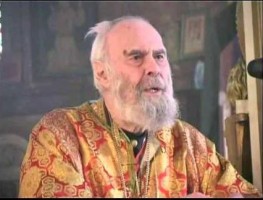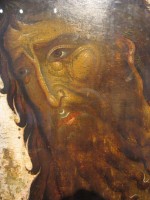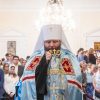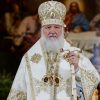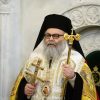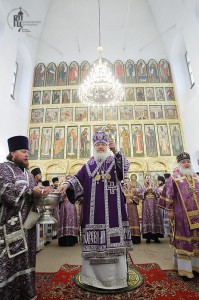 In the Name of the Father, and of the Son, and of the Holy Spirit!
In the Name of the Father, and of the Son, and of the Holy Spirit!
Today we celebrate the memory of the Holy Prophet, Forerunner, and Baptist John – the first and second findings of his head. Therefore the Gospel reading that we just heard is also dedicated to the Prophet and Forerunner John. The Lord said about him that no one born of women is greater than John the Baptist (cf. Matthew 11:11), for which reason he is also first among the ranks of saints. John was the Forerunner of the Savior; he softened the hearts of men, that they might be ready to accept the word of the Savior; John the Forerunner’s preaching was one of repentance (cf. Matthew 3:2). It was with these very words about repentance and the Kingdom of God that Christ the Savior began speaking His word to the people: Repent: for the kingdom of heaven is at hand (Matthew 4:17).
We just heard these words from the Gospel: And from the days of John the Baptist until now the kingdom of heaven suffereth violence, and the violent take it by force (Matthew 11:12). The Lord testifies that the Kingdom of God does not belong to every person. The Kingdom of God is a kind of goal to which people must aspire. And this goal cannot be acquired easily: opening the doors of the Kingdom of God requires force.
St. Basil the Great speaks about this wonderfully: “The desired end for each one of us is blessed eternity; we achieve this end by allowing God to reign over us.” The saint’s words help us better to understand what the Kingdom of God is. The Kingdom of God is that order of being in which God Himself reigns, and no other power, when His plan for creation is fully realized.
We know that an evil will entered into battle with God. God had, and has, the ability to put an end this battle at any time. The Savior Himself spoke of this when He was questioned, when it was demanded that He show His Divine power: at any moment innumerable angels could come to His defense (cf. Matthew 26:53; John 18:36). But this has not come about because God, having created man according to His image, allows him the ability to follow to the end the path that he himself has desired to choose. But the paths of man conclude in the Kingdom of God; and he who places himself under God’s authority will attain blessed eternity, as Basil the Great says.
 How wonderfully put! We need to allow God to reign over us. It is not God, by His might and limitless power, Who subjects us to His will; rather, it is we who by our own will submit ourselves to God. When the Lord in another place spoke the well-known words, The kingdom of God is within you (Luke 17:21), He bore witness to another truth that is revealed to us in today’s Gospel reading. The Lord bears witness that the Kingdom of God begins here on earth. One cannot live in hell here, and inherit the Kingdom of God there. One cannot perform deeds contrary to God’s will here – multiplying sin, lies, and unrighteousness; working not for God, but for the devil – and attain the Kingdom of God there.
How wonderfully put! We need to allow God to reign over us. It is not God, by His might and limitless power, Who subjects us to His will; rather, it is we who by our own will submit ourselves to God. When the Lord in another place spoke the well-known words, The kingdom of God is within you (Luke 17:21), He bore witness to another truth that is revealed to us in today’s Gospel reading. The Lord bears witness that the Kingdom of God begins here on earth. One cannot live in hell here, and inherit the Kingdom of God there. One cannot perform deeds contrary to God’s will here – multiplying sin, lies, and unrighteousness; working not for God, but for the devil – and attain the Kingdom of God there.
We should place ourselves under God’s authority here on earth, as St. Basil teaches us. Placing ourselves under God’s authority comes about as the result of our own free will. We simply need to strive to fulfill, as much as possible, God’s commandments, which are so simple and clear. By fulfilling these simple and clear commandments we allow God to reign over us. Then the rays of this Kingdom, which belong to eternity, will touch us even now through the entire depth of human unrighteousness and malice, through all the mountains of human sin. For if God will reign over us, then we will live in His Kingdom; and even if this Kingdom will not be around us, then, according to God’s word, it will be within us.
What kind of Kingdom is this? What did God want when creating the world? God Himself is absolute truth, absolute love, absolute beauty; and He desired that the world would become the same. He desired that these absolutes of His being be shared by people, by free and conscious beings. And if we place ourselves under God’s authority then we will enter this world of truth, love, and beauty.
We lack the words to describe that which God has prepared for those who love Him. The Apostle Paul, in a vision when caught up into heaven, heard angelic utterances, but could find no words to convey these utterances to us so that we could gain at least some understanding – he could only bear witness to a reality inaccessible to our consciousness (cf. 2 Corinthians 12:2-4). It is only by knowing that God is absolute perfection that we can imagine the Divine Kingdom, the Kingdom of unwaning light in which God abides eternally with those who love Him.
For many people, everything that has been said will seem somehow very far from life. Sin has penetrated deeply into people’s consciousness; the world is not arranged according to God’s law. All the efforts of people – even the most kind, intelligent, and pious – are directed simply towards keeping the world from turning into hell, for it has not been given to people to turn this world into paradise – only God has that authority. Therefore, existing in this world and overcoming difficulties, obstacles, temptations, allurements, and sinful assaults, we should aspire to the eternal Kingdom in which God reigns.
The Holy Forerunner and Baptist John preached the Kingdom of God more than 2,000 years ago, calling people to repentance, for it is by repentance that we open the door to this Kingdom. Today, completing the First Week of Great Lent, and remembering the great Prophet, Forerunner, and Baptist, let us entreat him that, by his intercession before God, he might grant us the strength, by repentance, to open the gates of the Heavenly Kingdom, in which God abides with those who love Him. Amen.
Delivered on March 12, 2011, in the Church of the Dormition in Pechatniki (Moscow). On that day the Feast of the First and Second Findings of the Precious Head of St. John the Baptist fell on the first Saturday of Great Lent.












